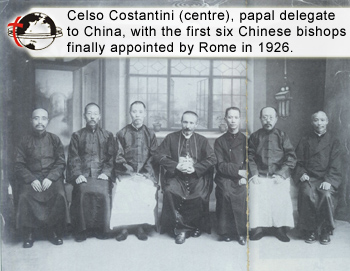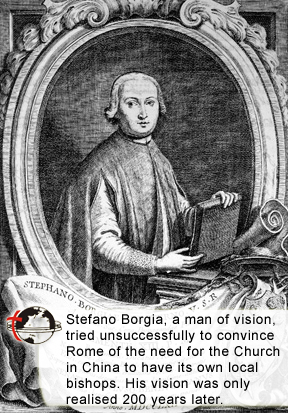
China Bridge (神州橋樑)_2006/Aug
Indigenous bishops in China: A vision delayed


Two of the most controversial issues in the history of the Church in China have been the indigenisation of the Chinese episcopacy and the adoption of the vernacular in the liturgy.
The first of these two issues was not realised until the consecration of the first six Chinese bishops by Pius XI in 1926. This year, 2006, commemorates the 80th anniversary of that important event. The second was the fruit of the Second Vatican Council, (1961-1965) and adopted only in the early 1990s – more then 200 years after Monsignor Stefano Borgia (1731-1804) had made his case for indigenous clergy and the liturgy in the vernacular! These issues were very much alive and illustrated in two little-known but remarkable memorials (1787) by the monsignor.
Father Gianni Criveller (PIME), who has been researching this fascinating topic, describes the monsignor as open minded, gentle and a true 18th century humanist. “In advocating the indigenisation of the China Church in that era, Monsignor Borgia was surely Propaganda Fide’s (today’s Congregation for the Evangelisation of Peoples) most enlightened leader. After him, only Celso Cardinal Costantini (1876-1958), among the congregation’s leaders, was as adamant on this matter.”
Secretary of Propaganda Fide from 1770-1789, then its pro-prefect from 25 May 1798 to 27 September 1800, Monsignor Borgia was prefect from 15 August 1802 until his death on 23 November 1804. His long association with the congregation fostered a deep concern with the progress and renewal of the Catholic missions. Father Criveller notes that “he had a genuine love for China, its people and all things Chinese. He had a close relationship with the Chinese priests studying in Italy.”
If the 18th century Church failed to see the need or value in having indigenous clergy and bishops in China, it should be remembered that these were novel ideas at the time. “Today,” says Father Criveller, “the advantages of using the vernacular in the liturgy as well as the fact that the ordinaries of the local Churches are indigenous whenever possible, is taken for granted.” He adds that the monsignor “strongly advocated the need to learn the local languages and culture, something considered quite radical then.”
There may well have been an urgent need for radical changes as the Church in China was in a precarious situation in the 18th century. There was a period of severe persecution in 1784 when, over an 18-month period, 19 foreign missionaries, several hundred Chinese priests, lay leaders and converts were arrested all over the country. “Many were forced to renounce their faith, while hundreds of Catholic leaders, including 33 Chinese priests, were exiled to the desert of Xinjiang,” says Father Criveller, adding that at least four priests, who trained in Naples, Italy, at the College for Chinese, died under duress along with eight foreign missionaries. Except for two, who were allowed to remain in Beijing, all missionaries were released and subsequently expelled from China.
As a result, European missionaries of Propaganda Fide remained in the provinces – a situation that gave Monsignor Borgia cause to be concerned about the fate of Catholicism in China. In response, he wrote two memorials proposing a solution to what he felt was a long-standing problem: the lack of an indigenous leadership.
In trying to convince Rome of the urgency of his proposals, the monsignor was adamant that it was against the Church’s tradition and harmful to evangelisation for the bishops in China not to be Chinese. He argued that the demise of Catholicism in Japan was due to the lack of native bishops and maintained that, since foreigners were prohibited from evangelising in China, they should refrain from openly challenging the law and putting the Chinese faithful in great danger. Father Criveller points out that Monsignor Borgia “felt that actively seeking martyrdom was not something to be recommended” and that it was, in fact, an act of temerity, adding that “disobedience to the laws of the country would only harm the local Catholics and arouse the suspicion that colonial interests were associated with the Catholic missions.”
Most of the time, non-Chinese bishops were in hiding, says Father Criveller, making it impossible for them to visit their flocks, and prompting Monsignor Borgia to remark that they “have eyes but cannot see, they have feet but cannot walk; they have mouths but cannot speak.” The monsignor recognised that the presence of foreign missionaries was needed for the first proclamation of the Gospel, but understood that their role is transitory since the fundamental custom of the Church from apostolic times was to entrust the leadership to local bishops.
Much of the difficulty in bringing about change revolved around the question of language, as Latin was required in the liturgy. With some irony, Monsignor Borgia pointed out the incongruity of compelling a Chinese priest to speak Latin in China! He insisted that a priest obtained no benefits from celebrating Mass in a language that he did not understand and that had little in relation with his own native tongue, and also contended that the people attending Mass derived no benefit from the Latin either. Interestingly enough, as early as 1615, Pope Paul V had already permitted the use of the vernacular under certain circumstances, since the supreme law of any apostolate was the salvation of souls.
Monsignor Borgia viewed zeal and charity as the fundamental characteristics of good shepherds and, as proved during the persecution, Chinese priests did not lack in these qualities. “For him, speaking Latin and knowing theology were not really essential qualities, when the salvation of souls was at stake,” says Father Criveller. “At a time when imperialism, colonialism and cultural superiority were common maladies in Europe, Monsignor Borgia’s statements stand tall as the ideas of a person with a lucid and superior vision.”
The cardinal consulters assembled on 5 March 1787, at the Sacred Congregation of Propaganda Fide’s Particular Congregation for China, to discuss Monsignor Borgia’s plan and concluded that nothing would change for the time being. The succeeding years were among the most turbulent in Church history with the invasion of Rome by the French Revolutionary army, the arrest and exile of Pope Pius VI and of Monsignor Borgia himself, as well as the temporary suppression of Propaganda Fide. At the same time, the Church in China continued to be suppressed and considered illegal. “It was still dangerous to carry out any ecclesiastic activity,” says Father Criveller. “These facts might somewhat mitigate the responsibility of the consulters of Propaganda Fide in deciding to postpone, sinedie, Borgia’s plan.”
The issue was raised repeatedly in the 19th century in the wake of new persecutions, but Propaganda Fide did not implement the monsignor’s plan, considering it too premature. Then too, control of the China missions by the French Protectorate impeded the promotion and development of an indigenous clergy. Father Criveller notes that while instructions urging missionaries and vicars apostolic to raise indigenous clergy and hierarchy were numerous and impressive for their openness, clarity of language and force of reasoning, Propaganda Fide was not consistent and coherent in implementing them.
A major obstacle was the objection by European missionaries, who did not consider the Chinese clergy ready to assume such a responsibility. When good opportunities did arise to elect Chinese bishops, Propaganda Fide failed to take advantage. “They had some good priest-candidates among the Chinese priests trained in Naples, in Pondichéry or in China itself,” says Father Criveller.
Finally, on 18 October 1926, 140 years after Monsignor Borgia put forward his proposal, then-Bishop Celso Costantini, the apostolic delegate to China, presented six Chinese priests to Pope Pius XI to be ordained bishops. They were the first Chinese bishops, since the isolated instance of Dominican friar, Gregory Luo Wenzao 羅文藻 (1616-1691, from Fuan, Fujian province), who was ordained bishop in 1685. Costantini, later secretary of Propaganda Fide, had finally succeeded – at least partially – where Monsignor Borgia had not.
“The Church in China, not administered by the Chinese themselves, remained in a certain sense, a foreign church for a long time,” says Father Criveller. “I think this has been the most serious failure in the history the Catholic mission in China.”


 ENG
ENG